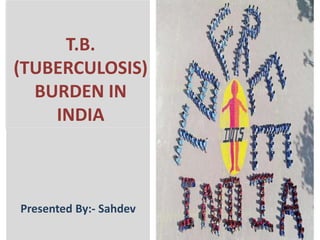Tuberculosis in india
- 2. Definition ï Tuberculosis(TB) is a potentially fatal contagious disease that can affect almost any part of the body but is an mainly infection of the lungs. It is caused by mycobacterium tuberculosis. ï Tubercule â Round nodule/swelling Osis â condition ï Tuberculosis (TB) control activities are implemented in the country for more than 50 years. The National TB Programme (NTP) was launched by the Government of India in 1962 in the form of District TB Centre model involved with BCG vaccination and TB treatment. In 1978, BCG vaccination was shifted under the Expanded Programme on Immunization.
- 7. Epidemiology
- 11. TB Burden in India
- 15. MDR & TB Cases
- 17. Diagnosis
- 20. Lab Tests
- 22. T.B. Program in India
- 23. Evolution of TB Program
- 24. RNTCP Program
- 28. Features
- 29. DOTS ïąAround the same time in1993, the WHO declared TB as a global emergency, devised the directly observed treatment â short course (DOTS), and recommended to follow it by all countries. The Government of India revitalized NTP as Revised National TB Control Programme (RNTCP) in the same year. DOTS was officially launched as the RNTCP strategy in 1997 and by the end of 2005 the entire country was covered under the programme.
- 30. Nikshay ïąNIKSHAY:- To facilitate TB notification, RNTCP has developed a case-based web-based TB surveillance system called âNIKSHAYâ (https://nikshay.gov.in ) for both government and private health care facilities. Future enhancements under NIKSHAY are for patients support, logistics management, direct data transfers, adherence support and to support interface agencies which are supporting programme to expand the reach.
- 31. Nikshay Poshak Yojna ïąIt is centrally sponsored scheme under National Health Mission (NHM), financial incentive of Rs.500/- per month is provided for nutritional support to each notified TB patient for duration for which the patient is on anti-TB treatment. Incentives are delivered through Direct benefit transfer (DBT) scheme to bank accounts of beneficiary*.
- 32. Second Phase 2006-11 ïąDuring 2006â11, in its second phase RNTCP improved the quality and reach of services, and worked to reach global case detection and cure targets. TB was the leading cause of illness and death among persons living with HIV/AIDS and large number of multidrug resistant TB (MDR-TB) cases were reported every year. During this period for achievement of the long term vision of a âTB free Indiaâ, National Strategic Plan for Tuberculosis Control 2012-2017 was documented with the goal of âuniversal access to quality TB diagnosis and treatment for all TB patients in the communityâ.
- 33. Plan for 2012-2017 ïąSignificant interventions and initiatives were taken during NSP 2012-2017 in terms of mandatory notification of all TB cases, integration of the programme with the general health services (National Health Mission), expansion of diagnostics services, programmatic management of drug resistant TB (PMDT) service expansion, single window service for TB-HIV cases, national drug resistance surveillance and revision of partnership guidelines.
- 34. National strategic plan for tuberculosis elimination 2017-2025 âĒ RNTCP has released a âNational strategic plan for tuberculosis 2017-2025â (NSP) for the control and elimination of TB in India by 2025. According to the NSP TB elimination have been integrated into the four strategic pillars of âDetect â Treat â Prevent â Buildâ (DTPB).
- 35. PPP ïą Public private partnership:- For promotion of public-private mix (PPM) in TB prevention and care, private providers are provided incentives for TB case notification, and for ensuring treatment adherence and treatment completion. The incentives are provided through direct beneficiary transfer. ïą The incentives to the Private Sector TB Care Provider are as follows: ï Rs 250/- on notification of a TB case diagnosed as per Standards for TB Care in India (STCI). ï Rs 250/- on completion of every month of treatment. ï Rs 500/- on completion of entire course of TB treatment. ï Rs 2750/ for notification and management of a drug-sensitive patient over 6-9 months as per STCI. ï Rs 6750/-for notification and correct management of a drug- resistant case over 24 months as per STCI.
- 36. Free drugs and diagnostic tests to TB patients in private sector âĒ Free drugs and diagnostic tests are provided to TB patients seeking treatment from private health sector. There are two approaches for ensuring access to free drugs and diagnostic tests to TB patients in private sector, first is access to programme- provided drugs and diagnostics through attractive linkages; and second is reimbursement of market- available drugs and diagnostics.
- 37. TB Elimination by 2025 âĒ However, to eliminate TB in India by 2025, five years ahead of the global target, a framework to guide the activities of all stakeholders including the national and state governments, development partners, civil society organizations, international agencies, research institutions, private sector, and many others whose work is relevant to TB elimination in India is formulated by RNTCP as National Strategic Plan for Tuberculosis Elimination 2017-2025.
- 40. Prevention ïķAir borne infection control measures ïķContact tracing ïķIsoniazid Preventive Therapy (IPT) ïķBCG vaccination ïķAddressing social determinants of TB like poverty, malnutrition, urbanization, indoor air pollution, etc. ïķBuild:- the form of building and strengthening enabling policies, empowering institutions and human resources with enhanced capacities. ïķBCC & IEC
- 41. T.B. Division in India
- 43. Organisation Structure of RNTCP
- 47. State Structure of RNTCP
- 49. Urban TB Control
- 50. MDTCS




















































